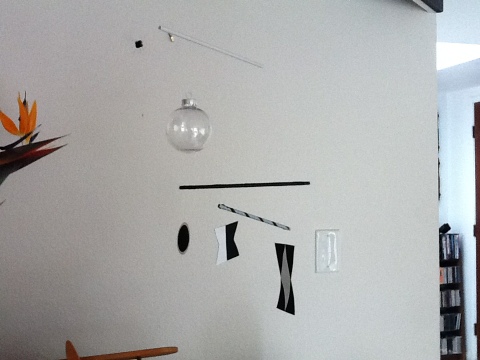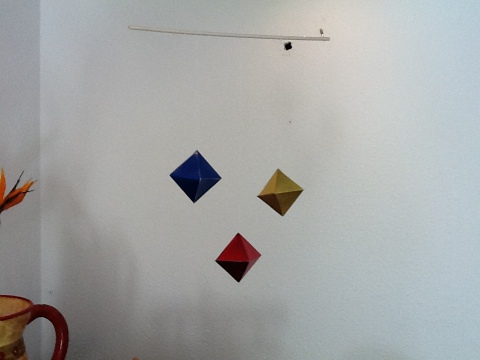Mobiles, part I
Our baby is due in 4 weeks, so I've been working feverishly to create materials that will support his development in the months to come.
One of the first materials a newborn is introduced to (after a couple of weeks of adapting to his surroundings) is the Munari mobile. This black & white mobile hangs close enough to the baby's face so he can focus on it with his limited range of vision (about 12-14 inches) but far enough so he can't accidentally swat it with his flailing arms and legs.
Why black & white? Because these two tones provide the most contrast of any two colors. Contrast is an important tool for developmental materials (not just in infancy but throughout development) because it gives the child sensorial boundaries that will allow him to recognize more nuanced differences as his senses sharpen. In other words, they allow the child to make comparisons and organize the impressions he receives from his environment as he begins to experience other colors. Of course, this all happens sub-consciously, but if we waited to provide stimulation until the child was conscious of everything that was happening in his mind, we'd miss the most important years in terms of development!
The next mobile that's introduced is the Octahedron mobile, composed of the three primary colors. This mobile is introduced around one month of age, around the same height as the Munari, and is also only for the visual sense (the baby shouldn't accidentally hit it). The three primary colors again provide boundaries that allow for even greater mental organization. Apart from the importance of their colors, these two mobiles are important visual introductions to two- and three-dimensional geometry.
I'll post more mobile information in the days to come (I'm working on a few more!). It's important to note that these mobiles are all hand-made at home, with basic materials (paper, scissors, glue, tape, wooden dowels, fishing line). All you need is a little bit of time and creativity, as well as the desire to provide your baby with the right developmental tools at the right time of his life.


One of the first materials a newborn is introduced to (after a couple of weeks of adapting to his surroundings) is the Munari mobile. This black & white mobile hangs close enough to the baby's face so he can focus on it with his limited range of vision (about 12-14 inches) but far enough so he can't accidentally swat it with his flailing arms and legs.
Why black & white? Because these two tones provide the most contrast of any two colors. Contrast is an important tool for developmental materials (not just in infancy but throughout development) because it gives the child sensorial boundaries that will allow him to recognize more nuanced differences as his senses sharpen. In other words, they allow the child to make comparisons and organize the impressions he receives from his environment as he begins to experience other colors. Of course, this all happens sub-consciously, but if we waited to provide stimulation until the child was conscious of everything that was happening in his mind, we'd miss the most important years in terms of development!
The next mobile that's introduced is the Octahedron mobile, composed of the three primary colors. This mobile is introduced around one month of age, around the same height as the Munari, and is also only for the visual sense (the baby shouldn't accidentally hit it). The three primary colors again provide boundaries that allow for even greater mental organization. Apart from the importance of their colors, these two mobiles are important visual introductions to two- and three-dimensional geometry.
I'll post more mobile information in the days to come (I'm working on a few more!). It's important to note that these mobiles are all hand-made at home, with basic materials (paper, scissors, glue, tape, wooden dowels, fishing line). All you need is a little bit of time and creativity, as well as the desire to provide your baby with the right developmental tools at the right time of his life.


Categories
- 3-6 (8)
- 6-9 (26)
- 9-12 (8)
- Positive Discipline (2)
- Conscious Parenting (12)
- Montessori Curriculum (9)
- Preparation of the Adult (14)
- Preparation of the Environment (11)
- Montessori Principles (11)
- Montessori Homeschooling (20)
- Language Arts (3)
- Math (3)
- Geography (2)
- Biology (1)
- History (2)
- Practical Life (1)
- Montessori Stories (4)

8 comments
Leave a comment